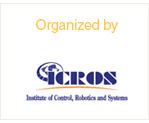An Intelligent Docking Station Manager for Multiple Mobile Service Robots
Proposing a GPU Based Modified Fuzzy Nearest Neighbor Rule for Traffic Sign Detection
A study on deterioration in proprioception related to low back pain and falls and postural sway response to local vibratory stimulation
Highly Accurate Stereo-based Measuring and Tracking System for Vessel Control
A Novel Flag-Language Remote Control Design for a Laparoscopic Camera Holder Using Image Processing
(By General Chair of ICCAS 2015)
Dissipative Filter Design for Takagi-Sugeno Fuzzy Neural Networks
Kyu Chul Lee (Korea University. Korea)
An Experimental Study on the Relationship between the Components and Movement of the Human Knee Using an Android Model - Measurement of Internal-External Rotation and Anterior-Posterior Tibial Translation
Daichi Yamauchi (Nagoya Institute of Technology, Japan)
Position Determination of a Popup Menu on Operation screens of a Teleoperation System using a Low Cost Head Tracker
Ryosuke Sugai (Tokyo Denki University, Japan)
Development of Image Viewer for Analyzing of Temporal Subtraction from Chest CT Images
Masashi Kondo (Kyushu Institute of Technology, Japan)
Automatic Segmentation of Phalanges Regions on MR Images Based on MSGVF Snakes
Koji Shigeyoshi (Kyushu Institute of Technology, Japan)
Best Presentation Award for Interactive Poster Sessions
(By Organizing Chair of ICCAS 2015)
Hoo State-Feedback Control for Continuous-Time Markovian Jump Systems with Partly Unknown Transition Probabilities
In Seok Park (POSTECH, Korea)
State Estimation for a Carbon Nanotube-based Sensor Array System
Hong Jang (KAIST, Korea)
T-S Fuzzy Control of IPMSM Using Backstepping Integral Sliding Mode
Abner Asignacion (Changwon National University, Korea)
Design of Roller-Cam Clutch Mechanism for Energy Efficiency and High BackDrivability of Lower Extremity Exoskeleton
Ho Jun Kim (Hanyang University, Korea)
Vision Based Robot for Recognizing and Grasping Fast Moving Conveyor Products
Longtan Wang (Pusan National University, Korea)
Simplified Assistive Devices for Upper Limbs
Ryoichi Suzuki (Kanazawa Institute of Technology, Korea)
Home-Legacy Device Intelligent Control Using ANFIS with Data Regeneration and Resampling
Jun ho Chung (Korea University, Korea)
A Binary Based HMAX Model for Object Recognition
Tae-Koo Kang (Sangmyung University, Korea)
EGI/IMU Integration Using Multiple IMUs and Error Damping Loop for SAR Motion Compensation
Jin Woo Song (Seoul National University, Korea)
SYNCHRONIZING NUMEROUS SAMPLING TASKS BY GEOMETRIC SERIES IN SENSOR FIELD
Rajasekar Rangasamy (Tagore Institute of Engineering and Technology, India)
Mechanism and system design of MAV(micro aerial vehicle)-type wall-climbing robot for inspection of wind blades and non-flat surfaces
Sungwook Jung (KAIST, Korea)
Ground Vehicle Localization based on Inertial Measurement Signals
JUHUI GIM (Pusan National University, Korea)
Separation of the Hemodynamic Responses in a Simultaneous Audio-Stimuli using ICA: An fNIRS Study
Hendrik Santosa (Pusan National University, Korea)
Spasticity Mathematical Modeling in compliant with Modified Ashworth Scale and Modified Tardieu Scale
Noor Ayuni binti Che Zakaria (Shibaura Institute of Technology, Japan)
Mathematical Modeling of a Variable Displacement Vane Pump for Engine Lubrication
Bui Ngoc Minh Truong (University of Ulsan, Korea)
Estimating Desired Yaw Rate and Control Strategy Analysis on Developed Air ESC System for Performance Evaluation
Seunghwan Chung (Hanyang University, Korea)
Nonlinear Tire Inverse Model for Integrated Chassis Control System
Boryeon Kang (Pusan National University, Korea)
3-Dimensional Position Control Scheme for Mobile Harbor Crane
Dongho Kim (KAIST, Korea)
Outstanding Paper Award
This award is to recognize the most outstanding paper based on the quality of the contribution. All award winners will be announced at the Banquet.
Application: The author who makes the initial submission can apply for this award by uploading the application form together with the paper.
Evaluation: Those candidate papers are forwarded to Award Committee, and reviewed once again after the regular review process.
- Sponsored by the Ministry of Trade, Industry and Energy and the ICCAS 2015 conference (Certificate)
Download: ICCAS 2015 Outstanding Paper Award Application Form.doc
Student Best Paper Award
This award is to recognize the most outstanding paper co-authored by a student based on the quality of the technical contribution and the presentation. All award winners will be announced at the Banquet.
Eligibility: The applicant should be a student as well as the first author. He/she also has to present the paper at the conference. Students are defined as full-time students, enrolled for degrees or diplomas with a university or another similar institution.
Application: The author can claim for the application when the initial submission is made, by uploading the nomination form signed by the advisor.
Evaluation: Award committee members review those papers again after the regular review process. In addition, the award committee will examine the presentation during the conference. Note that all the student best paper candidates will be assigned to the oral lecture session for presentation.
- Sponsored by the ICCAS 2015 conference (Certificate)
Download: ICCAS 2015 Student Best Paper Award Nomination Form.doc
Best Presentation Award for Interactive Poster Sessions
All award winners will be announced at the end of the each poster session.
Eligibility: Every presenter at the interactive poster sessions.
Evaluation: A few anonymous examiners will evaluate each poster and interaction.
- Sponsored by the ICCAS 2015 conference (Galaxy tab or equivalent and Certificate)
 Awards ICCAS2015 > Awards
Awards ICCAS2015 > Awards









